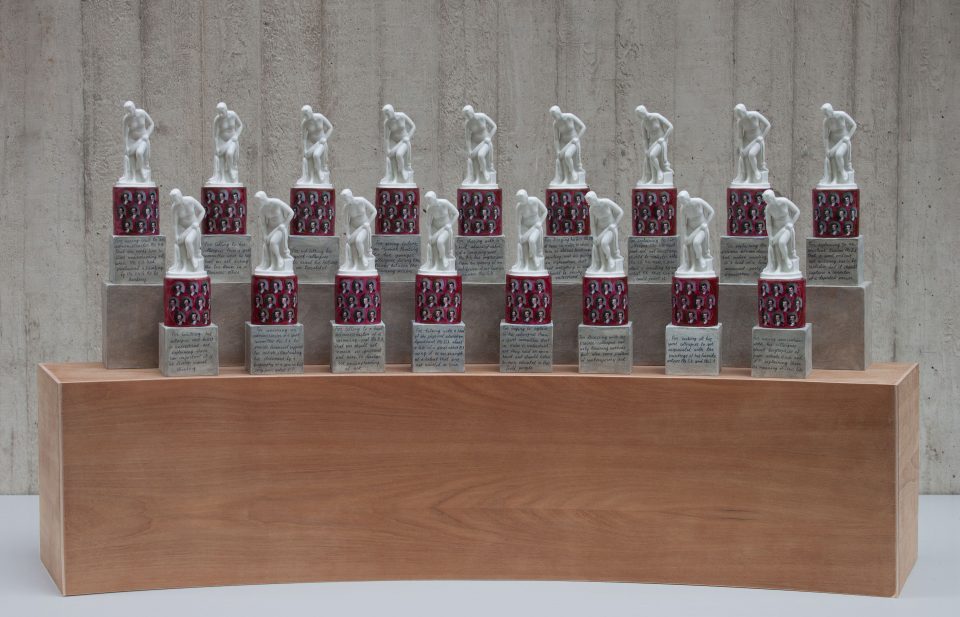
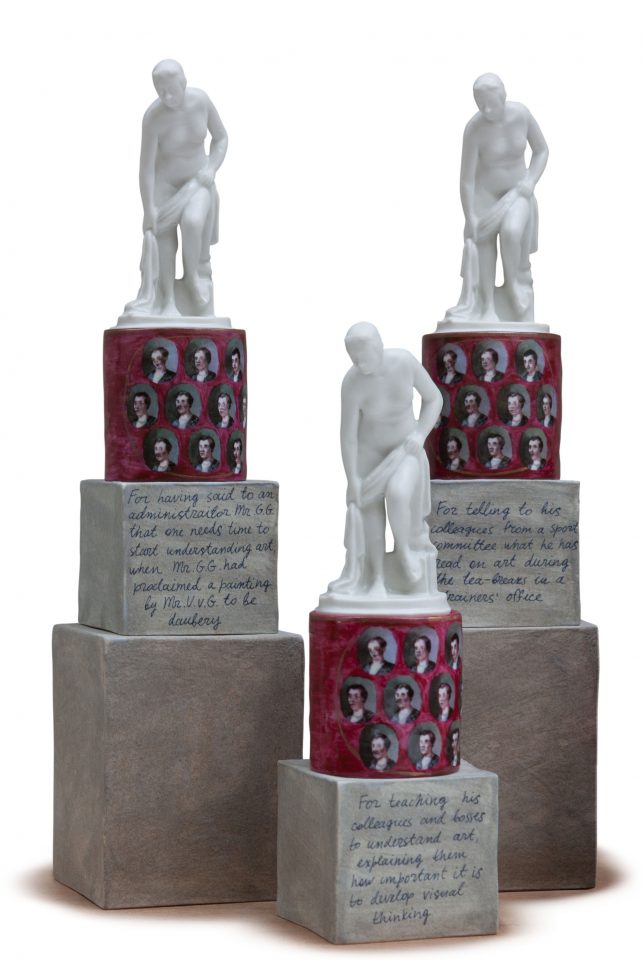 4.2-1 | 4.2-2 | 4.2-3H ~26 cm | For teaching his colleagues and bosses to understand art, explaining them how important it is to develop visual thinking • H ~38 cm | For having said to an administrator Mr. G.G. that one needs time to start understanding art, when Mr. G.G. had proclaimed a painting by Mr. V.v.G. to be daubery || H ~26 cm | For telling to his colleagues from a sport committee what he has read on art during the tea-breaks in a trainers’ office
4.2-1 | 4.2-2 | 4.2-3H ~26 cm | For teaching his colleagues and bosses to understand art, explaining them how important it is to develop visual thinking • H ~38 cm | For having said to an administrator Mr. G.G. that one needs time to start understanding art, when Mr. G.G. had proclaimed a painting by Mr. V.v.G. to be daubery || H ~26 cm | For telling to his colleagues from a sport committee what he has read on art during the tea-breaks in a trainers’ office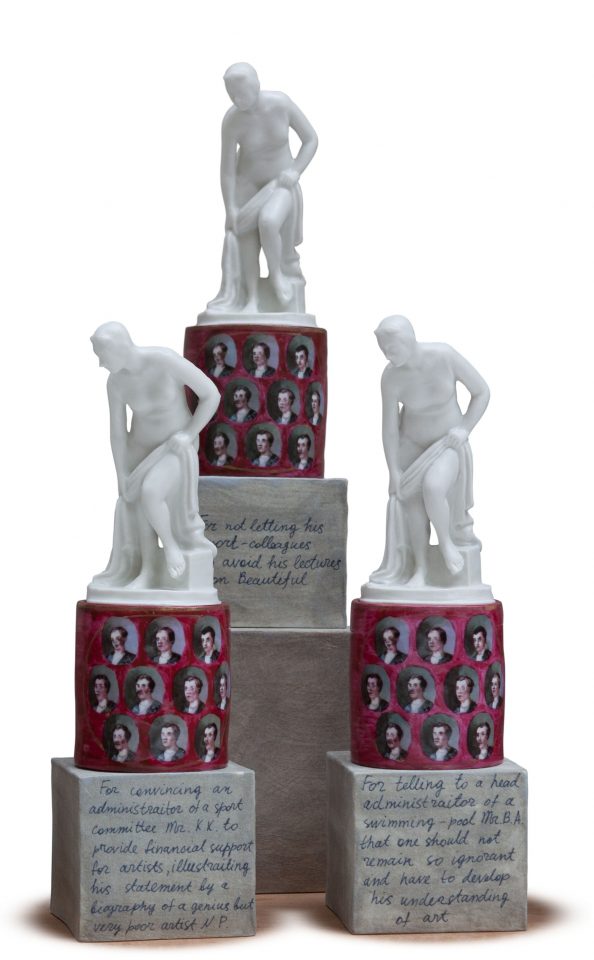 4.2-4 | 4.2-5 | 4.2-6H ~26 cm | For convincing an administrator of a sport committee Mr. K.K. to provide financial support for artists, illustrating his statement by a biography of a genius but very poor artist N.P. || H ~38 cm | For not letting his sport-colleagues to avoid his lectures on Beautiful | H ~26 cm | For telling to a head administrator of a swimming-pool Mr. B.A. that one should not remain so ignorant and have to develop his understanding of art
4.2-4 | 4.2-5 | 4.2-6H ~26 cm | For convincing an administrator of a sport committee Mr. K.K. to provide financial support for artists, illustrating his statement by a biography of a genius but very poor artist N.P. || H ~38 cm | For not letting his sport-colleagues to avoid his lectures on Beautiful | H ~26 cm | For telling to a head administrator of a swimming-pool Mr. B.A. that one should not remain so ignorant and have to develop his understanding of art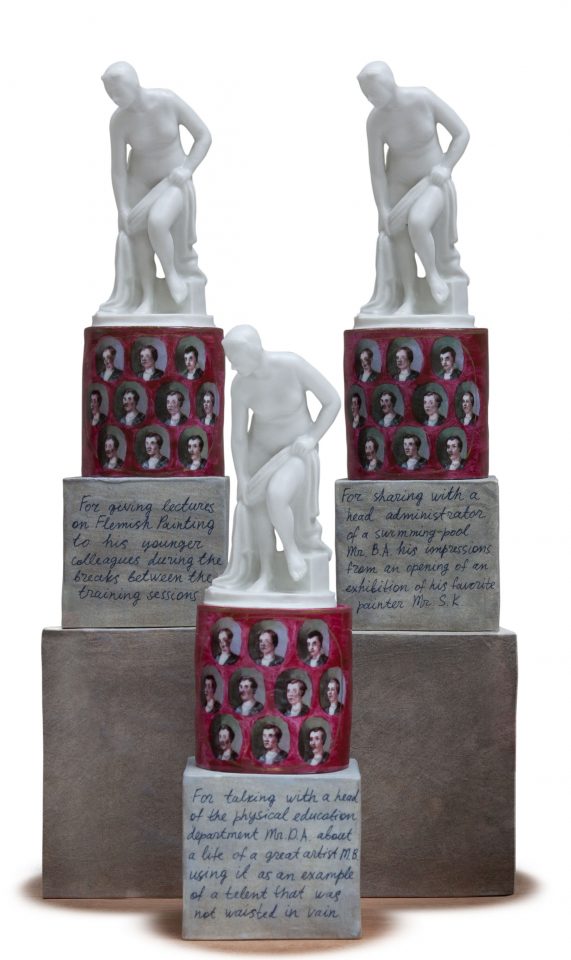 4.2-7 | 4.2-8 | 4.2-9H ~38 cm | For giving lectures on Flemish Painting to his younger colleagues during the breaks between the training sessions || H ~26 cm | For talking with a head of the physical education department Mr. D.A. about a life of a great artist M.B., using it as an example of a talent that was not wasted in vain || H ~38 cm | For sharing with a head administrator of a swimming-pool Mr. B.A. his impressions from an opening of an exhibition of his favorite painter Mr. S.K.
4.2-7 | 4.2-8 | 4.2-9H ~38 cm | For giving lectures on Flemish Painting to his younger colleagues during the breaks between the training sessions || H ~26 cm | For talking with a head of the physical education department Mr. D.A. about a life of a great artist M.B., using it as an example of a talent that was not wasted in vain || H ~38 cm | For sharing with a head administrator of a swimming-pool Mr. B.A. his impressions from an opening of an exhibition of his favorite painter Mr. S.K.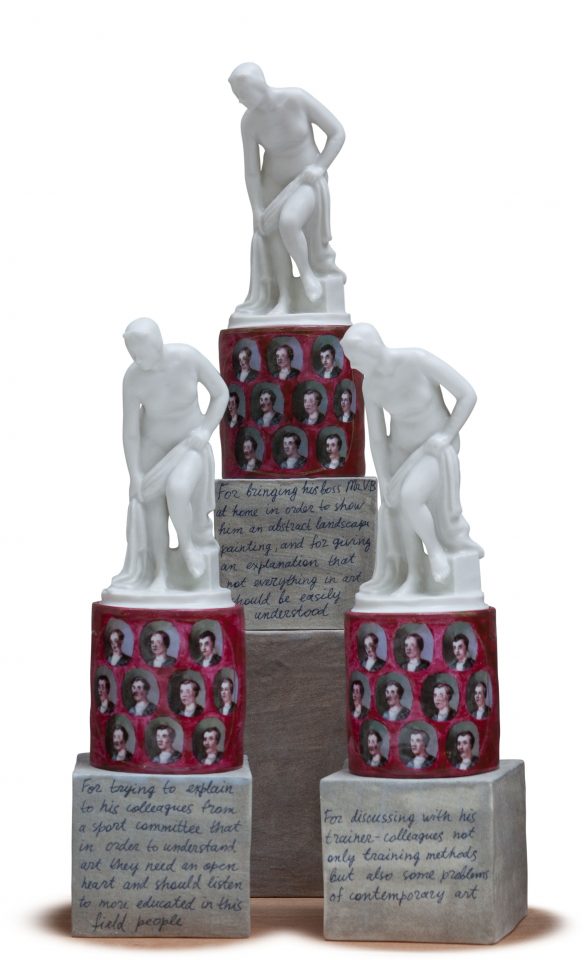 4.2-10 | 4.2-11 | 4.2-12H ~26 cm | For trying to explain to his colleagues from a sport committee that in order to understand art they need an open heart and should listen to more educated in this field people || H ~38 cm | For bringing his boss Mr. V.B. at home in order to show him an abstract landscape painting and for giving an explanation, that not everything in art should be easily understood || H ~26 cm | For discussing with his trainer-colleagues not only training methods but also some problems of contemporary art
4.2-10 | 4.2-11 | 4.2-12H ~26 cm | For trying to explain to his colleagues from a sport committee that in order to understand art they need an open heart and should listen to more educated in this field people || H ~38 cm | For bringing his boss Mr. V.B. at home in order to show him an abstract landscape painting and for giving an explanation, that not everything in art should be easily understood || H ~26 cm | For discussing with his trainer-colleagues not only training methods but also some problems of contemporary art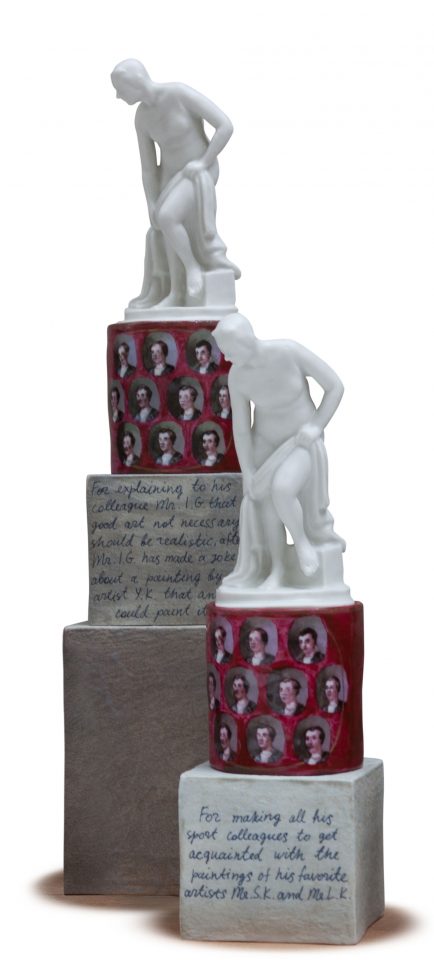 4.2-13 | 4.2-14H ~38 cm | For explaining to his colleague Mr. I.G. that good art not necessary should be realistic, after Mr. I.G. has made a joke about a painting by an artist Y.K. that any ass could paint it || H ~26 cm | For making all his sport colleagues to get acquainted with the paintings of his favourite artists S.K. and L.K.
4.2-13 | 4.2-14H ~38 cm | For explaining to his colleague Mr. I.G. that good art not necessary should be realistic, after Mr. I.G. has made a joke about a painting by an artist Y.K. that any ass could paint it || H ~26 cm | For making all his sport colleagues to get acquainted with the paintings of his favourite artists S.K. and L.K.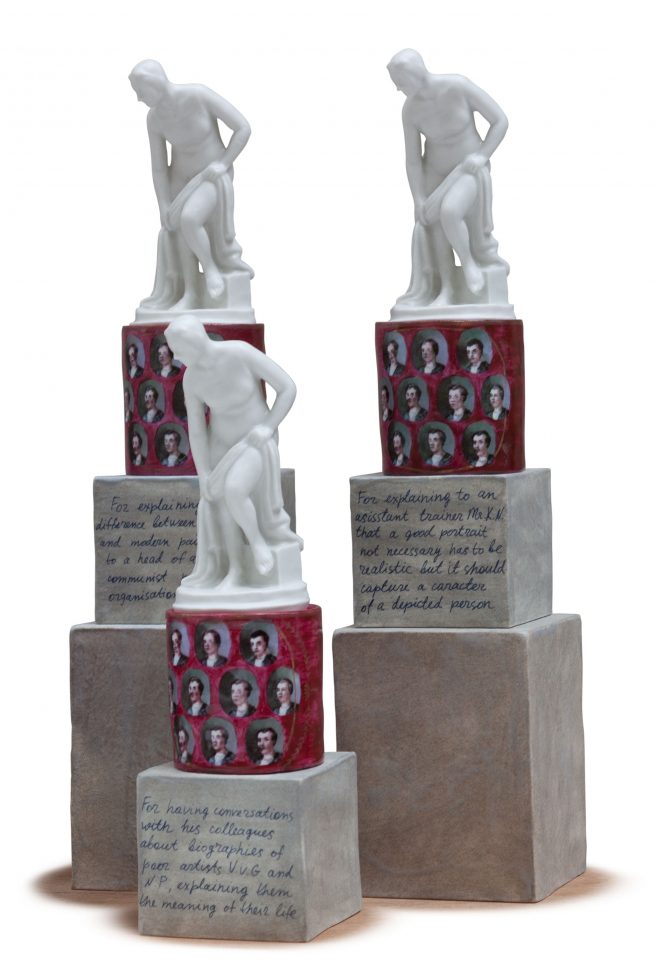 4.2-15 | 4.2-16 | 4.2-17H ~38 cm | For explaining the difference between classical and modern painting to a head of a local communist party organisation Mr. G.T. || H ~26 cm | For having conversations with his colleagues about biographies of poor artists V.v.G. and N.P., explaining them the meaning of their life || H ~38 cm | For explaining to an assistant trainer Mr. K.N. that a good portrait not necessary has to be realistic but it should capture a character of a depicted person
4.2-15 | 4.2-16 | 4.2-17H ~38 cm | For explaining the difference between classical and modern painting to a head of a local communist party organisation Mr. G.T. || H ~26 cm | For having conversations with his colleagues about biographies of poor artists V.v.G. and N.P., explaining them the meaning of their life || H ~38 cm | For explaining to an assistant trainer Mr. K.N. that a good portrait not necessary has to be realistic but it should capture a character of a depicted person-
The Trophy Cups,
or What Could have Happened to My Father.Since my childhood I have already known that one of the biggest misfortunes, which could happen to a person, is to live with the feeling, that you have not realized your talent and just wasted your life. I even remember that chill coming over my heart that this can happen to me as well. I do not know why, but I could hardly imagine anything worse than that.
My father was a swimming coach. He was born in a small village. When he was a child he went regularly to a local river to swim and to exercise, trying to find out his own swimming technique and to improve his results. In other words, he had a vocation to become a coach. I have to smile every time when I try to imagine how my father was coaching himself as a child.
Almost 30 years ago my father was one of the best coaches in the Soviet national swim- ming team. He was very innovative and devoted to his work; he had his own vision of coaching methods. It was extremely important to him to have a success, to get better results, to win. The swimming pool was his second home. After working with him his swim- mers essentially improved their results. That time was a heyday of his career. He was invited to move from provincial Minsk to Leningrad or to Moscow. He was also invited to work as a coach in the USA and Canada; sport magazines were publishing articles about his coaching methods. He told me that at least ten of his swimmers were on their way to Olym- pic medals.
But then some circumstances started to hinder his career. My mother did not want to move to Leningrad or to Moscow. To move abroad was also impossible to my father, because the family could not go with him. Also his straight character and his intransigence to an incom- petence of the sport functionaries had a consequence that he was slowly removed from the leading position. Even to the Olympic games in Canada, where his swimmer won a medal, my father went not as a coach, but as a tourist, watching his victory from stands as an ordi- nary sideliner. For many years his best and most promising swimmers were taken away from him and transferred to other coaches. At a certain moment he became very frustrated and decided to leave the professional sport, feeling totally unrealized and underestimated as a coach. He could prepare many champions, but instead he had to finish his career as an ordinary sport teacher at the University in Minsk.
I always felt that my father had a lot regrets and unrealized ambitions. These days he is devoted to some other than sport matters. He became an art admirer and started to collect paintings. He often goes to the village, where he was born and grown up. He likes to walk there in the places, where he trained himself as a child. And I think he is very happy, because now he sees everything around him with the different eyes, as an artist. I also think, that he always was an artist.
At that time, when he left his job as a coach, he probably thought, that his life was over. But in fact, talent and ambitions can be realized in some other ways and forms than we think, and these ways can make us even happier. As my grandmother would have say about my father’s sport career: "Plague take it!"
So now, in this work, I also try to reflect on, what is at the end a "realization"? Could it take different forms? Maybe the most important thing is not a professional success, but rather that, what is left in shadow, is much more important and valuable?
Supported by the Mondriaan Fonds and The Frozen Fountain.
-